|
Newsletter inside|out - IT news at ETH Zurich (22.03.2017)
 |  |
 |  |
 |  |
 |
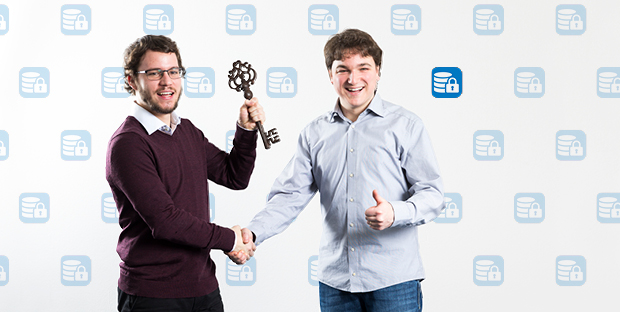 | 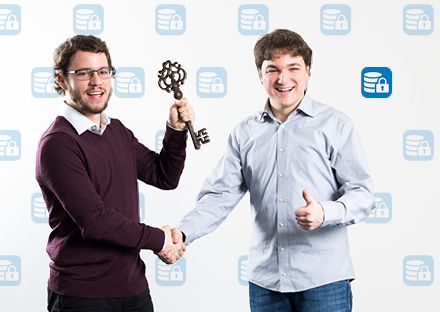 |
| The group who installed Leonhard, represented by Allen Neeser (High Performance Computing, ITS SIS) on the right, is now passing the "key" to its encrypted data to its users, represented by Balazs Laurenczy (Research Informatics, ITS SIS). |
New ETH Platform Leonhard Open & Med |
Scientific IT Services is going to provide an infrastructure for Big Data Analytics. The new research infrastructure comprises two clusters: "Leonhard Med" for sensitive data, in particular from biomedical research, and "Leonhard Open" for regular "open" research data. Both clusters are equipped with a storage system providing fast parallel access to the data. In addition, different types of compute nodes, including nodes with GPUs are installed. The Leonhard platform is optimized to meet the increasing need for data analytics software including "machine learning" approaches.
Leonhard is a new data-centric computing platform operated by the Scientific IT Services on behalf of the research community of ETH Zurich. The "Leonhard Med" project was initiated in summer 2016 to address the needs of the new biomedical research community at ETH and was approved by the ETH Executive Board in September 2016. Leonhard is funded both by ETH centrally and by its users (so-called "shareholders").
Big Data applications require not only massive amounts of storage, but also enough computing capacity to process these data, as well as state-of-the-art analysis methods. To this end, Leonhard offers multiple petabytes (PB) of high-performance, scalable storage, different types of compute nodes (high-throughput, large-memory, GPUs) optimised for specific use cases, and popular data analysis and machine learning software (Hadoop, R, Spark, TensorFlow, etc.).
One part of Leonhard ("Leonhard Open") is a normal compute cluster intended for scientists dealing with open (non-sensitive) research data; the other part ("Leonhard Med") is a secure system intended for confidential data, like data sets from personalized medicine. In general, the name "Leonhard" refers to the whole platform. For security reasons, each part has its own dedicated storage, network connection and login nodes. This separation, together with built-in encryption, provides multiple levels of security for confidential data. More information can be found in our Wiki.
Dr. Olivier Byrde, Head of High Performance Computing (ITS SIS)
|
|
|  |
 |
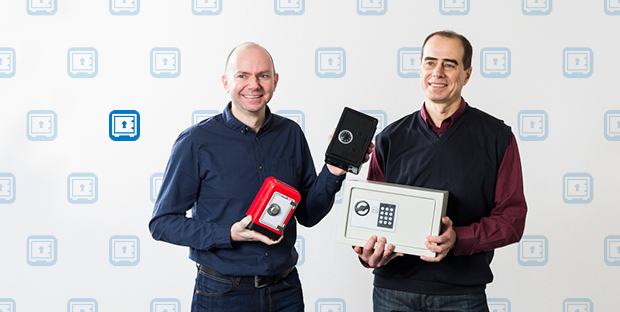 | 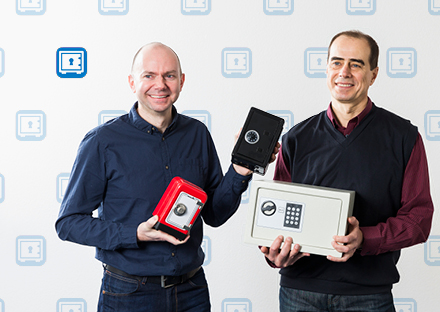 |
| Which safe would you like? Jürg Järmann (ITS PPF, left) and Anatoliy Holinger (ITS NET) examined different password safes for ETH staff. |
Password Safe - secure, and always with you |
The requirements of password security are constantly growing. They are expected to be long, complex, unique and therefore difficult to crack. To make matters worse, users are supposed to create an individual password for each service and application. Who is actually able to remember this flood of long, complicated and unique passwords? Fortunately, there are support services which facilitate handling your passwords. An ETH work group took a closer look at several password manager programs.
Password managers make the creation, management and use of secure passwords easier. In principle, they should be available on all common platforms and mobile devices. The key advantage: Users only have to remember one single master password. This password will open the safe for the release of other passwords which are then simply copied into the applications and log-in windows.
A work group consisting of representatives from IT Services and the two departments Architecture and Computer Science wanted to find out exactly what’s involved and evaluated some of the common password managers for this purpose.
The group made recommendations for two password safes: The commercial password manager Enpass and the free product KeePass. Both recommended tools are able to synchronise the data via ETH Zurich’s polybox. More information about the recommendations and handling passwords in the ITS Blog.
Jürg Järmann, Group Portfolio Management (ITS PPF)
|
|
|  |
 |
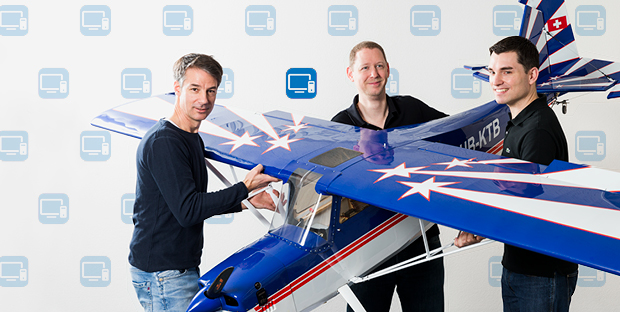 | 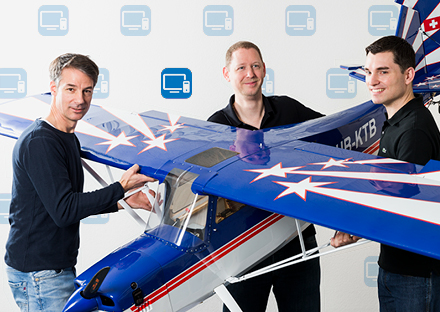 |
| Christoph Schwyter, Adrian Trenz and Gianni Antonitti (from left) have started up the new ZO-Client. They are ensuring stable and safe operations through their regular maintenance work. |
The Windows 10 ZO-Client is approaching the landing strip |
To prepare for increased requirements of more mobility in the future, the central bodies (ZO) of ETH Zurich will receive a new client setup. The Windows 10 ZO-Client was developed from scratch and will be available during the second quarter of 2017 as a managed, Windows-based IT workstation (SLA WAP-ZO). In addition to a new operating system and an updated Office Suite, it will also include new technologies enabling improved functioning and more effective use of the IT workplace device. ZO-Support as ISG is responsible for the "Windows workspace WAP-ZO" service.
7 years of Windows 7. Now, ZO-Support is replacing the client setup introduced in 2010 with contemporary Windows 10 and Office 2016. New software versions and technologies were implemented to support ZO-staff in regards to operating comfort and increased mobility requirements. Whether on the train, in a meeting or in the home office - the wish to access data from anywhere will now be fulfilled. Thanks to offline synchronisation, these data will be available at all times. Back in the office, they will automatically be saved in the data storage on the server. A new data storage system "myshare" will replace the previous U-drive and make it possible to save all personal data in one place. A new Windows file server will make for seamless synchronisation and present the remaining storage capacities to each user in the file explorer. Long wait times when logging on and logging off will be a thing of the past since roaming profiles have been eliminated and replaced by rerouting the directories involved straight to the data storage system. More information about the "Windows workspace WAP-ZO" for ZO-staff is available through the ZO-Support InfoPortal.
Gianni Antonitti, Group Manager ZO-Support (ITS SDL)
|
|
|  |
|
|